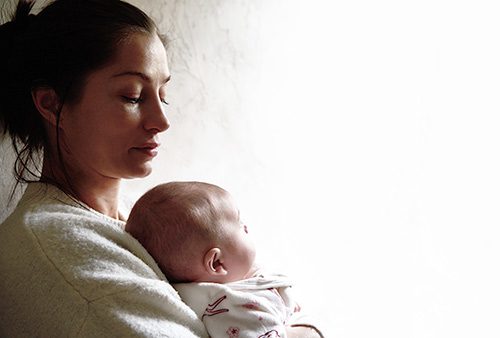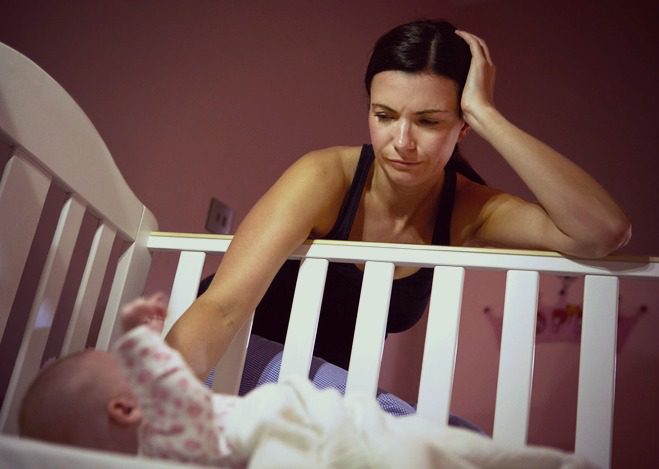
This type of depression can come from a number of events. These events then trigger what is called “post-adoption depression.” Left unaddressed, post-adoption depression, or PAD, can lead to long-term struggles for both you and your child.
Your family and friends might say things that only make you feel worse, such as, “You should be so happy now! You waited so long for this!” and “You wanted this. Be happy she’s got a family to take care of her now.” These types of remarks make adoptive parents embarrassed even to mention their feelings.
Most families that adopt have worked for months or years to make their dream of adoption a reality. They have likely spent ample time and money to make this dream come true, as well as every step towards creating the ideal environment for a baby. As such, adoptive moms and dads are sometimes surprised that they aren’t perfect parents or completely overjoyed every second of every day once the baby comes home. This reality may cause disappointment, guilt, and even depression.
A Brief History of PAD
In 1995, June Bond, an author, adoption professional, and adoptive mother, first described post-adoption depression in literature. She wrote an article for the adoption magazine Roots and Wings, which is currently out of print.
Bond picked up on the dynamics of post-adoption depression syndrome after the child was home. As she performed post-placement home visits, Bond noticed that the adoptive parents’ mood did not reflect the joy or happiness that she had expected to witness.
Four years later, in 1999, Harriet McCarthy began doing exploratory research. As an adoptive mother herself, McCarthy had experienced post-adoption depression firsthand. She went on to conduct an online survey of 145 people who had become parents through international adoption. More than 65% of survey respondents reported experiencing post-adoption depression.
Causes and Signs of Post-Adoption Depression
Most adoptive parents find themselves exhausted at the end of the adoption process, despite the immense joy of bringing their baby home. What’s important is being self-aware and proactive. If these feelings arise, talk to an adoption-competent therapist and surround yourself with supportive people.

- Changing to a lifestyle of parenting full-time
- A long, drawn-out adoption process
- Lack of sleep
- Years spent coping with infertility and failed fertility treatments
- The release of pent-up tension from your adoption wait
- A lack of control in the adoption wait and infertility
- Financial stress
- Unmet or unrealistic expectations that adoptive parents held of themselves or their child
- Uncertainty over the relationship with your baby’s birth parents
A combination of these causes at the end of your adoption journey can leave you vulnerable to:
- Excessive guilt, perhaps around the grief your child’s birth family is experiencing
- Feelings of inadequacy
- Feeling undeserving
- Sense of hopelessness
- Feelings of powerlessness
- Feelings of worthlessness
The signs of post-adoption depression are similar to those of depression in general and include:
- No interest or joy in the activities you used to enjoy
- Difficulty concentrating or making decisions
- Needing extra sleep or having a hard time sleeping
- Loss of energy
- Change in appetite
- Extreme weight loss or gain
- Lots of guilt
- Feeling worthless, powerless, and/or hopeless
- Irritability
If you have thoughts of harming yourself or your child, it is a crisis, and professional help should be pursued immediately.
Parents with PAD may be confused and surprised by how they feel and even question whether the decision to adopt was right. One adoptive mother who was diagnosed as having post-adoption depression explains that in her particular situation, she didn’t feel that she was “allowed” to take maternity leave, ask for help from friends and family, or let on to anyone how tough it was to have a newborn. She felt it wasn’t her “right” as someone who had worked so hard for infant adoption, and who had not gone through the physical toll of pregnancy and childbirth, to ask for any sort of help or special treatment.
In her case, she was able to eventually recognize her symptoms for what they were and seek help from friends, family, and her doctor. It was hard, but she learned to let others know what she needed and to have more realistic expectations of herself. She found that those around her were eager to help and offer the support she and her husband needed to make the transition to parenthood.
Explore PAD Before You Adopt
Most parents are exhausted at the end of their adoption journey. It is so easy to become caught up in the ups and downs of the process and the yearning for a birth parent to choose you.
Despite this exhaustion, discussing the possibility of PAD before you adopt is important for the sake of your future child. Evidence indicates that if a parent is struggling with symptoms of depression, then their child may be impacted negatively.
If you are a prospective adoptive parent, be honest with yourself. Have you ever struggled with low self-esteem, anxiety, or depression? What was helpful in overcoming those feelings? For those who are adopting because they have been unable to have a child biologically, has the grief over infertility been resolved? For parents who adopted transracially, is there an awareness of racial identity for both the family and the child?
Parental post-adoption depression (PAD) is an important area to discuss both before and after you adopt. However, hopeful adoptive parents tend to find this topic uncomfortable or even scary to think about. It can be reassuring to learn that PAD only affects some adoptive parents, not the majority. Studies estimate that PAD affects 11% to 12% of parents. These findings show that while PAD is not widespread, it is also not uncommon.
If an adoptive parent is wary about seeking help for post-adoption depression, then it can help to know that therapy will support their entire family, not just themselves. There are several ways to alleviate and manage symptoms of depression.
How to Cope With Post-Adoption Depression
Surround yourself with positive people. Practice self-care: when the baby naps, take a nap too and turn off your phone. Get outside and breathe in the fresh air whenever you can, take your baby for a walk around the neighborhood. It’ll let you get in some physical activity. Make sure you’re eating quality, nutritious food.
Take comfort in the fact that other adoptive mothers have gone through post-adoption depression, and are now experiencing the joy parenting can bring. It does get better.
If you continue to experience depression for more than a month, please seek the advice of a qualified doctor who works with post-partum depression. Also, we suggest contacting a counselor specializing in adoption issues.
Of course, the best thing to do is get this help early on and avoid suffering the baby blues altogether. Here are some tips that will help you through the settling-in period after your infant’s adoption:
- Have realistic expectations of yourself, your spouse, and your baby. None of you will be perfect, and that’s okay.
- Don’t be afraid to ask friends and family for help. Lack of sleep and the constant demands of a newborn are no joke. No matter how much you love your little one, you will get tired, and you will need help. Take it when it’s offered, and ask for it if it isn’t. You’ll be a better parent for it.
- Don’t be afraid to ask professionals for help. Whether you’re the adoptive mother or father, if you find yourself feeling down for more than a few days, talk to your family doctor.
Taking these three easy steps will help you be the best parent you can be for your new little one.
Mardie Caldwell Shares About Post-Adoption Depression
In open adoption, adoptive parents remain in regular contact with the birth parent contact in the best interest of their child. However, this can trigger feelings of worthlessness or inadequacy in the parent who adopted.
After they adopt, adoptive parents encounter a variety of complex emotions while they adjust to life with a newborn in addition to a new relationship with their child’s birth mother. Many adoptive parents have felt relieved, while others feel hopeless after adoption.
For some, especially adoptive moms, the pressure to be a perfect parent, know all the answers, or have everything under control can become overwhelming. Lifetime’s Founder, Mardie Caldwell, knows this firsthand, having experienced PAD herself. She shares this tip with adoptive parents: “After we adopted our son, I found it helpful to get out and attend a comedy show with my husband as a date night.”
She shares an inside look “beyond the blessing” in an adoption webinar, “Mardie Caldwell Shares About the Pressure to be the Perfect Adoptive Parent.” Mardie speaks from the heart about her first days as a new adoptive mom. In this sensitive and validating webinar, you’ll learn more about post-adoption depression, in addition to topics like honoring your promises to your child’s birth mother and bonding with a new child through a wealth of emotions. You can tune into this webinar for free at AdoptionWebinar.com.
Causes of post-adoption depression include unmet or unrealistic expectations which adoptive parents hold of themselves, their child, family, and friends. Commonly, the most challenging expectations to reframe are of ourselves as parents.
Lifetime Adoption recognizes the very normal feelings of stress that adoptive parents might experience as they cope with their new challenges and expectations. However, these challenges can be conquered by getting enough sleep, physical activity, and healthy food, as well as with the help of mental health professionals.
Editor’s Note: This article was originally published on July 3, 2017, and has since been updated.
As Vice President of Lifetime Adoption, Heather Featherston holds an MBA and is passionate about working with those facing adoption, pregnancy, and parenting issues. Heather has conducted training for birth parent advocates, spoken to professional groups, and has appeared on television and radio to discuss the multiple aspects of adoption. She has provided one-on-one support to women and hopeful adoptive parents working through adoption decisions.
Since 2002, she has been helping pregnant women and others in crisis to learn more about adoption. Heather also trains and speaks nationwide to pregnancy clinics to effectively meet the needs of women who want to explore adoption for their child. Today, she continues to address the concerns women have about adoption and supports the needs of women who choose adoption for their child.
As a published author of the book Called to Adoption, Featherston loves to see God’s hand at work every day as she helps children and families come together through adoption.




0 Comments